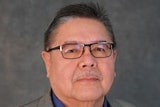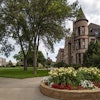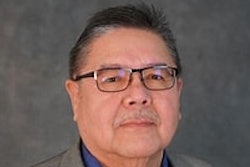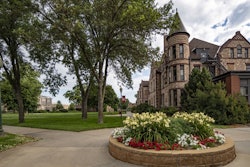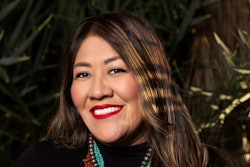At the College of the Muscogee Nation, faculty and staff carefully laid out printouts of every student’s class schedule on a table. They slipped the schedules into envelopes along with each student’s homework assignments for the next two weeks and mailed them out. It took a couple of days.
The tribal college in Oklahoma serves many students from rural areas where internet access is scant, so mail was a quick fix as the college moved online. As the coronavirus began to spread, instructors tried to safely continue teaching in person for as long as possible, but the campus is now closed until the end of the term with students taking their classes remotely to the extent they can.
For the campus community, it’s not only logistically challenging. It feels like a loss.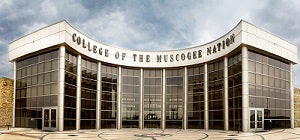
“The in-person, face-to-face contact is probably one of our biggest strengths here at the tribal college because of the emphasis on Muscogee culture, values and language embedded into all of the curriculum,” said Dean of Academic Affairs Dr. Monte Randall. “It’s been a challenge to move that online.”
Tribal colleges and universities – which serve more than 16,000 Native American students – have been hard hit by the coronavirus, as they try to support some of the poorest student populations in remote rural areas with limited technology and funds.
For one thing, tribal lands have notoriously spotty access to the Internet, which makes widespread online education no easy task.
In 2018, the Federal Communications Commission found that about 35% of Americans living on tribal lands don’t have broadband service compared to 8% of Americans overall. And the broadband these schools do have is often poor-quality and expensive. Tribal colleges pay between $40,000 and $250,000 per year for internet access, according to a survey by EDUCAUSE and the American Indian Higher Education Consortium (AIHEC).
“Tribal colleges have the most expensive and slowest internet access of any higher education institution in the country,” said Carrie Billy, AIHEC’s president and CEO.
For Billy, the lack of internet access has been an “ongoing frustration.” She’s been advocating for years that tribal colleges should be included in the E-Rate Program, a federal program that helps schools and libraries get affordable internet access.
“We could have been better prepared,” she said.
To confront the problem, at least for the moment, schools are discussing putting internet hotspots in towns within driving distance. It isn’t possible to give students hotspots at home – too many live in areas far from cell towers or blocked off by mountains. But this way, students can at least access their online course materials from their cars, and other community members can use the internet as well.
In addition to challenges with internet access, tribal colleges also have to budget for the many needs of their low-income students in the wake of the coronavirus. About 78% of their student population are Pell Grant recipients, which means students rely heavily on campus resources like dining halls, health and wellness services, library databases and computer labs.
At the College of the Muscogee Nation, many students don’t own computers, so the library tried to rent out as many laptops as it could for students to take home. But eventually it had to stop, which “left a void with many of our students,” said Randall. Most students have their own cellphones, but the small screens are difficult for online coursework, so the college left a drop box open on campus for printed assignments and extended deadlines to ease students’ stress.
“We’re just trying to do the best we can,” he said.
Last week, policymakers tried to help these institutions respond to the pandemic, allocating $20 million to tribal colleges and universities in the latest stimulus package, the Coronavirus Aid, Relief, and Economic Security Act.
While appreciative, Billy noted there are additional steps Congress could take, like providing emergency student aid, which she described as an “immediate need” for Native American students potentially going home to food deserts and packed, low-income housing. She’d also like to see Congress work on better broadband access for colleges in rural areas.
“We really need to pay attention to addressing the digital divide in our country,” she said. “It’s really shameful it still exists. We’re not seeing in the latest bill a real policy indication that Congress understands that.”
In the meantime, tribal colleges have been collaborating to come up with solutions, swapping best practices on weekly webinars facilitated by AIHEC.
“We’re all getting through this together,” said Cory Sangrey-Billy, president of Stone Child College in Montana. “We’re making sure we’re still meeting the needs of students, the needs of our community.”
She’s hopeful tribal colleges will come out of this experience better equipped to offer remote learning, which could “open up some doors” after the crisis passes. More online education would enable tribe members living outside of reservations to take advantage of tribal colleges’ courses, she said.
In their online meetings, Randall described an “attitude of resolve” among tribal college leaders.
“As Native Americans, we’ve faced adversity,” he said, citing the diseases tribes contracted on first contact with colonists as an example. “We’re going to continue our mission to educate our people and continue to move forward. This is a challenge that we’re facing. [But] we know our people. We know what they need … We’re still here. We’ve been here.”
Sara Weissman can be reached at [email protected].
